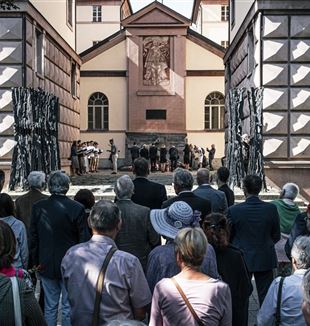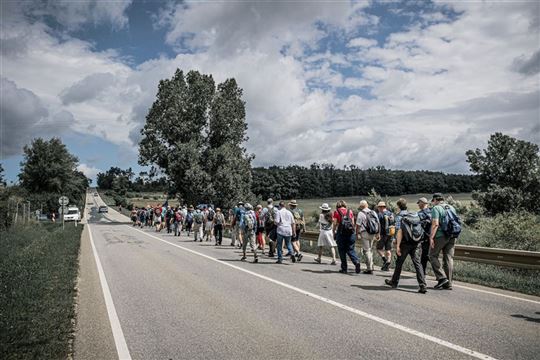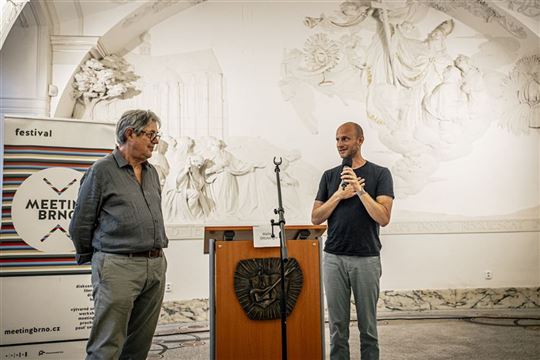
Czech Republic: From memory, a task
Born around the Reconciliation March between Czechs and Germans, in a town symbolic of wounds and divisions, the Brno Meeting put hope and the desire to walk together at the center of the 2024 edition.In 1945, when World War II ended and Czechoslovakia was re-established as it was before the conflict, the Germans, who had lived there for centuries, were forced into exile. The Sudetenland, in particular, was home to one of the historically wealthiest sectors of the population, which would never agree to support a pro-communist government. The new regime in Prague thus succeeded in driving them out of the places where they lived, also committing crimes against those who appeared to be the perpetrators of the atrocities that had occurred during the recent conflict.
In the city of Brno, the center of Moravia, women, children and elderly people of Germanic descent were suddenly forced to abandon their homes and to walk more than 50 kilometers to the Austrian border. Most died along the way; others were tortured and killed. It was a story of revenge that met its epilogue in the town of Pohorelice, about a day's walk from Brno. Passing by there today one can see, in a clearing that runs along the main artery that connects the south of the region to Vienna, a gravestone and a number of crosses that have been placed there to safeguard the 890 people buried there by their own torturers.
For the past nine years, at the beginning of summer, those who participate in the Reconciliation March have met in this meadow. It is an event organized by local, German and Czech institutions, and which seeks to remember what happened almost 70 years ago by walking a 30-kilometer-long route that follows back the road along which more than a thousand people died. And it was in March that the annual Brno Meeting was launched in 2016: an event organized by members of the local Communion and Liberation community that is inspired by the Meeting for Friendship among Peoples in Rimini and that each year sees numerous events and meetings that animate the life of the city.
The title of the recent edition was “From Trauma to Hope,” and again this year, Czechs, Slovaks, Poles, Belorussians but also Germans and even some Italians walked together during the march. So many peoples united, not by mere commemorative fervor, but guided by the knowledge that “reconciliation and dialogue begin now. It is a responsibility that we have now,” David Macek, among the organizers of the Meeting, explained at the end of the walk.
Martha, a woman of German descent living in Brno who lost an aunt during the 1945 march, was among those walking: “Now that my mom is also gone, I realize that I cannot avoid looking at my past. I need to make memory of what my family has suffered in order to live today.” That is why she decided to come, alone, but open to getting to know those who walk beside her.
The arrival point is the Brno monastery dedicated to St. Thomas, a place famous in the city. In fact, the biologist Gregor Mendel, the father of modern genetics, lived here. After being welcomed by the local authorities, David introduced the meeting with Walter Ottolenghi, who was among the members of Communion and Liberation who in the 1960s went beyond the Iron Curtain to meet the Christian communities living there. Walter has been invited to the Meeting to present the new edition of the book Quando c'era la cortina di ferro. Storie di un destino ritrovato tra due Europe [When there was the Iron Curtain. Stories of a rediscovered destiny between two Europes]. The book gathers the testimonies of members of CL between the 1960s and 1980s who had traveled to Eastern Europe: “Here we met people who were living their faith. They were frightened people but at the same time serene because they were aware that they had a task,” Walter recounted.
It is the same gladness that Cardinal Pierbattista Pizzaballa, Patriarch of Jerusalem of the Latins, spoke in his recorded video interview. The video was shown the following day in the Cathedral after the Mass celebrated by Brno Bishop Pavel Konzbul. Pizzaballa told of his own recent visit to Gaza where “the first thing I saw was destruction. I already knew that that would be the situation, but seeing all that desolation with my own eyes filled me with sadness.” He continued: “There is nothing left in that land, people need everything; however, I caught a positive aspect that I can testify to: the small Christian community living there is frightened but serene; I did not hear any words of hatred. Everyone wants to contribute to the reconstruction.”
An image comes to mind that was often used by a figure who was particularly dear to those who live in this land: Vaclav Havel, the first president of the Czech Republic, who in his famous book The Power of the Powerless states that “they could not foresee that this would be the snowball that would trigger an avalanche.” Where does such hope come from, which makes us certain that the individual really does affect history?
The beginning of an answer was offered by Miriam, a Polish nun of the Pauline order who has been in Brno for some time. She spoke of her own encounter with Communion and Liberation during her years in Jerusalem: “What struck me was to find people with a great desire to meet the other, to know their history and then walk together. It is from here that a people is generated.”
Read also - Encuentro Santiago's "open reason"
Getting to know each other's history and walking together. This is what happened during these days, not only by remembering a tragedy dating back almost 70 years. The dialogues that arose among those who met and with the various guests who animated the Meeting showed that peace is something that takes time and concerns everyone. When Ottolenghi asked Fr. Giussani how to help those who lived beyond the Curtain, he received a simple yet unequivocal answer, “Keep them company.”
One would be inclined to ask, “Is that all?” But the beginning of an answer to this question also comes: Cardinal Pizzaballa at the end of his interview, addressing the participants of the Meeting, invited everyone to pray for them: “And if you can, come and visit us. Only in this way,” the Patriarch added, ”is it possible to see what is not yet accomplished be fulfilled.”